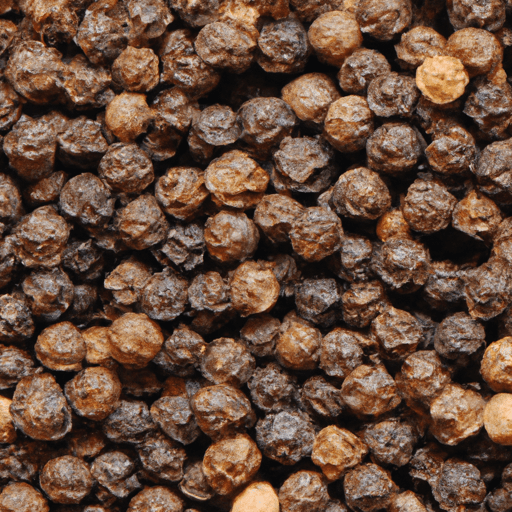The Bold and Beautiful Black Pepper: A Versatile Spice Steeped in Flavor
If there’s one spice that has stood the test of time, it’s black pepper. From ancient civilizations to contemporary kitchens, this bold and beautiful seasoning has been an indispensable ingredient in countless recipes. Let’s dive into the world of black pepper and explore its intriguing taste, versatile uses in cooking, nutritional value, and fascinating history.
Unleashing the Taste of Black Pepper
Black pepper, scientifically known as Piper nigrum, enchants our taste buds with its distinctively pungent and earthy flavor. Native to the tropical regions of South Asia, this flowering vine produces small, unripe fruits known as peppercorns. Once harvested, these peppercorns are left to dry, developing their signature black outer layer.
When ground, black pepper releases a captivating aroma, marking its presence in a dish without overpowering other flavors. Its heat is mild yet assertive, sparking a zesty sensation on the tongue. The versatility of black pepper lies in its ability to add depth and complexity wherever it’s used.
A Staple in the Culinary World
From the simplest home-cooked meals to Michelin-starred extravaganzas, black pepper finds its way into an endless array of recipes. Its presence is ubiquitous, making it a staple in every culinary enthusiast’s pantry.
Black pepper gracefully enhances the flavor of almost any savory dish. It pairs effortlessly with meats, vegetables, soups, stews, and sauces, bringing harmony to the overall taste profile. Sprinkling a pinch of freshly ground black pepper on a steaming bowl of creamy mashed potatoes adds a delightful warmth. Likewise, a simple grilled steak comes alive with the addition of a black pepper crust.
Beyond Flavor: Nutritional Powerhouse
Beyond its culinary prowess, black pepper packs a surprising nutritional punch. It is rich in vitamins, minerals, and plant compounds that contribute to overall well-being. Though consumed in small quantities, black pepper offers several health benefits:
Antioxidant Power: Black pepper contains a compound called piperine, which exhibits powerful antioxidant properties. These antioxidants help fight against free radicals, potentially reducing the risk of chronic diseases.
Enhanced Nutrient Absorption: Piperine also aids in the absorption of essential nutrients, such as vitamins A and C, beta-carotene, selenium, and iron. Sprinkling black pepper on your favorite dish can optimize your body’s utilization of these valuable nutrients.
Digestive Aid: Black pepper has long been lauded for its potential to improve digestion. Its active compounds stimulate the secretion of digestive enzymes, promoting efficient digestion and alleviating discomfort.
A Journey Through History
The illustrious history of black pepper is as captivating as its taste. Initially cultivated in India over 4,000 years ago, black pepper quickly captivated the ancient world. Its demand became so pronounced that it sparked the infamous Spice Route, an extensive network of trade routes connecting the East and the West.
During the medieval period, black pepper was known as “black gold” due to its precious nature, often used as currency or a form of tribute. The allure of pepper led to the exploration of new lands, contributing to the age of discovery.
Fun Facts About Black Pepper
Here are a few fascinating facts to pique your interest:
- India, Vietnam, and Indonesia are the major producers of black pepper, collectively accounting for 50% of global production.
- White, green, and red peppercorns come from the same vine as black pepper but are processed differently.
- Ancient Egyptians used black pepper in the mummification process, valuing its preservation qualities.
Whether you’re a seasoned chef or an aspiring home cook, black pepper is an essential ingredient that adds soul to your culinary creations. Its robust flavor, versatility, and countless health benefits make it a true superstar in the world of spices. So, the next time you sprinkle black pepper onto your dish, take a moment to appreciate its vibrant history and celebrate its bold and beautiful essence.
Origin
- Black pepper (Piper nigrum) is native to the Malabar Coast of India, but it is now cultivated in various tropical regions around the world.
- The spice dates back to at least 2000 BCE and was highly prized in ancient trade routes, leading to its widespread use and popularity.
Common Uses
- Black pepper is one of the most widely used spices worldwide and is a pantry staple in many cuisines.
- It is used both as a seasoning and as a table condiment.
- It adds depth and warmth to dishes and enhances the flavor of many savory foods.
Nutritional Benefits
- Black pepper is rich in vitamins and minerals, including vitamin K, iron, manganese, and fiber.
- It is a good source of antioxidants, which help fight against harmful free radicals in the body.
- Consuming black pepper may potentially aid digestion and increase the absorption of certain nutrients.
Unique Properties
- The pungent taste in black pepper comes from a compound called piperine, which gives it its characteristic spicy and slightly earthy flavor.
- Black pepper has a distinct aroma due to volatile essential oils present in its outer layer.
- When freshly ground, black pepper releases more of its aromatic compounds and provides a stronger flavor compared to pre-ground pepper.
Historical Significance
- In ancient times, black pepper was often used as a form of currency and was referred to as “black gold.”
- It played a significant role in spice trade routes, garnering high value and contributing to explorations.
- The desire to find alternate routes to obtain black pepper and other spices was one of the factors that led to the Age of Exploration in the 15th century.




Use the share button below if you liked it.
It makes me smile, when I see it.